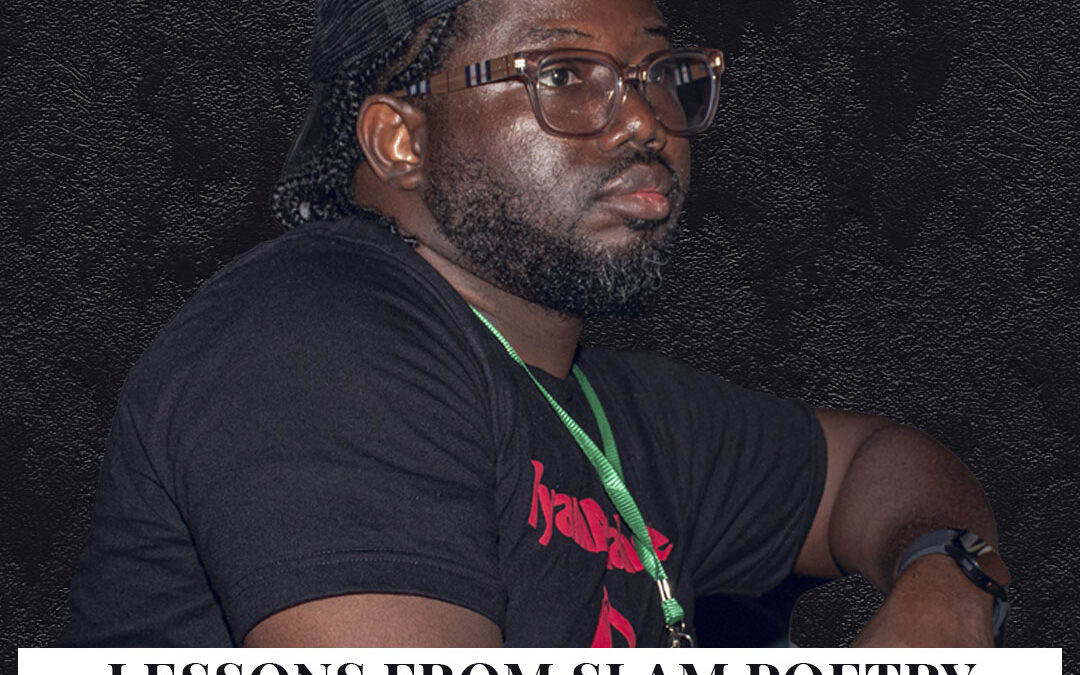Beyond Borders, Beneath the Mic, slam poetry is more than performance. It is people, structure, and purpose. I have watched countries breathe poetry with different lungs. Some with rhythm but no ribs. Others, a full skeleton and skin funded, intentional, and fierce.
In this reflection, I share what I’ve witnessed across six countries Ghana, Kenya, Togo, Brazil, South Africa, and Mexico and draw out the key tensions, opportunities, and lessons that slam masters, organizers, and cultural leaders must urgently consider.
GHANA: The Heartbeat Without a Drumbeat EHALAKASA remains the pulse of Ghana’s slam ecosystem, holding down two core national programs: • The Ehalakasa National Grand Slam, and • The SheShe Slam, a civic-themed platform spotlighting women’s voices and governance themes. But here’s the tension: while talent abounds, it is scattered in silos. There’s no shortage of gifted performers, but many operate in individualistic pockets or micro-groups, creating a fragmented scene.
The result? • Weak communal synergy • Repetitive platforms • A lack of collective movement advocacy
Remedy: To truly rise, Ghana’s slam community must invest in infrastructure, not only talent. This means: • Inter-group collaborations • Shared rehearsal spaces • A national registry of slam poets and collectives • Continuous coaching and civic education Slam thrives not where poets shine alone, but where systems sustain them together.
KENYA: Slam as Sacrifice In Nairobi, I witnessed something rare: a slam scene driven by love, not ego. At the heart of this energy is Creative Spills a community that doesn’t just host events but lives the movement. Poets, organizers, DJs, videographers, and even sound techs volunteer passionately, not for applause, but for impact. There, slam isn’t a gig. It’s a gift.
Challenge: Limited external funding threatens to burn out these passionate warriors.
Remedy: Kenya’s slam scene has the heart. Now it needs: • Strategic partnerships (corporate & civic) • Monetized programs (e.g., school tours, merch, workshops) • A national slam championship that feeds into continental representation When spirit meets structure, revolutions happen.
TOGO: A Quiet Flame with a Steady Matchstick Togo’s scene is small but spirited. From my travels and participation in Lomé, I’ve noticed multiple slam platforms, but most operate in isolation.
The glue? The Calebasse Challenge a consistently run slam that acts as both unifier and energizer. It has kept the flame of Togolese slam poetry from dying out completely.
Challenge: Without a strong organizational spine or national slam framework, Togo risks becoming a series of one-off events with no growth trajectory.
Remedy: Invest in national-level programming anchored by The Calebasse Challenge as a convening force. Also, push for Francophone-Anglophone collaborations that transcend language and broaden continental impact.
BRAZIL: What Happens When Slam Is Taken Seriously The FLUP Festival in Rio de Janeiro host of the 2023 World Poetry Slam Championship was a revelation. Brazil doesn’t just perform poetry. It funds it. Organizes it. Advocates. Celebrates it.
At FLUP: • Slam was central, not side-programmed • Infrastructure was professional • Local and global voices were integrated seamlessly • The audience understood poetry as both resistance and celebration • Even after the championship, the FLUP festival continues to amplify poetic expression year-round.
Challenge: Brazil’s context is unique resourced, resounding, and ready. But its scale shouldn’t intimidate. Lesson for Africa: We don’t have to copy the FLUP model, but we must document, archive, and celebrate our poetic milestones with equal intent. Legacy matters.
SOUTH AFRICA: Academy Meets Advocacy Though I haven’t experienced it firsthand, my research and conversations with respected cultural insiders confirm this: Poetry Africa Festival, presented by the University of KwaZulu-Natal’s Centre for Creative Arts, offers one of the most academically aligned slam infrastructures on the continent. It blends performance with pedagogy, scholarship with stagecraft.
Opportunity: This is a model for integrating slam into formal educational frameworks—an avenue Ghana, Togo, and others can explore.
Recommendation: Slam organizers should seek partnerships with universities, colleges, and schools. Let slam be part of civic education, language studies, and leadership training.
MEXICO: Proof That Heart Can Beat Budget Ciudad Juárez taught me that resource scarcity is no excuse for poor impact. Mexico hosted the World Slam Championship with a small but committed team. Despite funding hurdles, language diversity, and logistical challenges, they delivered a powerful experience marked by: • Community spirit • Volunteer dedication • Cultural pride • Strategic efficiency
Lesson: Africa has what it takes. If Mexico could deliver a world-class event with fewer resources, then we have no excuse not to organize slam systems that work.
This journey has taught me: Slam is not uniform, but it is universal. Every country holds a different key: • Ghana has the pulse • Kenya has the heart • Togo has the match • Brazil has the machinery • South Africa has the mind • Mexico has the grit What Africa needs now is a unifying blueprint one that respects local flavors but insists on continental cooperation. We must start building systems, not spectacles. Poets, not only performers. Teams, not only talent. And maybe, just maybe if we commit to this vision, we won’t just have national slam champions.
We’ll have national slam institutions.

